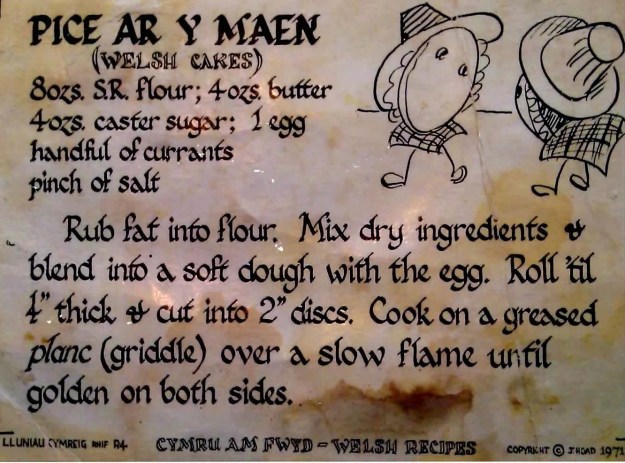 A Welsh bishop who lived in the 6th century, St.David does not get the global recognition or celebrations that St.Patrick gets later in March but his day is still widely celebrated in his homeland. Many people in Wales will wear a leek or a daffodil on March 1st in recognition of the day but as that would probably raise some eyebrows where I live I opted for a culinary celebration: a batch of humble yet delicious welsh cakes.
A Welsh bishop who lived in the 6th century, St.David does not get the global recognition or celebrations that St.Patrick gets later in March but his day is still widely celebrated in his homeland. Many people in Wales will wear a leek or a daffodil on March 1st in recognition of the day but as that would probably raise some eyebrows where I live I opted for a culinary celebration: a batch of humble yet delicious welsh cakes.
I hesitate to call this an old family recipe but it did come from my Welsh mother-in-law in the form of an an old postcard that is suitably tattered and stained from many years in the kitchen.
I had never paid much attention to the source of the card but a little research revealed the story of Jeremiah Hoad, an accomplished artist whose work was not simply restricted to whimsical Welsh postcards. His life encompassed a range of Celtic influences. He was born in Scotland in 1924 to an Irish father and an anglo-Scottish mother. He moved to England at the age of 15 and studied at Winchester School of Art. In 1967 he moved to rural Wales and in the early 70s produced the “Lluniau Cymreig” range of postcards and prints featuring black and white line drawings of Welsh influenced themes and landscapes. From 1981 until his death in 1999 he lived in Donegal and produced many fine landscapes of that beautiful part of Ireland. You can see more of his work here.
With the impromptu art history lesson out of the way it is time to focus on the recipe. It calls for two ingredients commonly found in British baking recipes but less common on this side of the Atlantic. If you don’t have self raising flour to hand you can make it yourself by adding baking powder and salt to all purpose flour. Caster sugar is a finely ground sugar: finer than regular granulated but not as fine as powdered. It often crops up in British baking recipes as it is easier to incorporate into the other ingredients and melts faster. You can substitute “superfine” sugar or make your own by whizzing up some granulated sugar in a food processor. In this particular recipe I find you can get away with using regular granulated sugar.
Welsh Cakes
8oz all purpose flour
1 tablespoon baking powder
0.5 teaspoon salt
4oz unsalted butter
4oz sugar (granulated or caster)
1 egg
4oz currants or raisins
Pinch of salt
Milk
Mix the flour, baking powder and salt together.
Rub the butter into the flour mix. This can be done quickly and easily in a food processor.
Add the sugar, currants, egg and a pinch of salt to the mix and combine into a soft dough. If the mix is too dry you can add a splash of milk to help bring it together.
On a floured surface, roll the dough until it is about a quarter of an inch thick and then cut circles of about 2 – 3 inches.
Lightly grease a griddle or pan with butter and then cook the cakes over a medium-low heat until they are golden on both sides, around 5 minutes per side.


